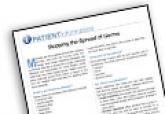An experimental influenza drug could become the first in a new class of influenza antivirals, according to HHS. The drug (known as both JNJ-872 and VX787) is being developed by Janssen Pharmaceuticals Inc. (Titusville, NJ), with technical assistance and funding from the HHS Office of the Assistant Secretary for Preparedness and Response Biomedical Advanced Research and Development Authority (BARDA).
Related: Mass Transit for Viruses
Studies to date suggest that the drug may provide clinical benefits even when administered much later than 48 hours after symptoms begin, unlike other FDA-approved medicines. Patients are not typically hospitalized within 48 hours of symptom onset, so doctors and patients need treatment options that are effective later in the course of the illness, said BARDA Director Robin Robinson, PhD.
The drug has a unique mechanism of action different from already available antiviral drugs. That could be an important feature, HHS says, as flu viruses—particularly those with pandemic potential—emerge that are resistant to current drugs.
Related: Stopping the Spread of Germs
Another novel approach to treating patients with influenza comes in the form of a monoclonal antibody therapeutic drug (VIS410), developed by Visterra, Inc. (Cambridge, MA). The drug targets a part of the virus common to a wide range of flu strains. The target area evolves much more slowly than areas targeted by approved drugs, which could allow VIS410 to work against strains that are resistant to current antivirals, HHS says. Preclinical studies suggest that the drug could be safe and effective in high-risk patients, such as the elderly and children.
Related: HHS Contracts for Quick and Easy Flu Shots
No monoclonal antibody antiviral drugs for influenza have yet been approved by the FDA.

